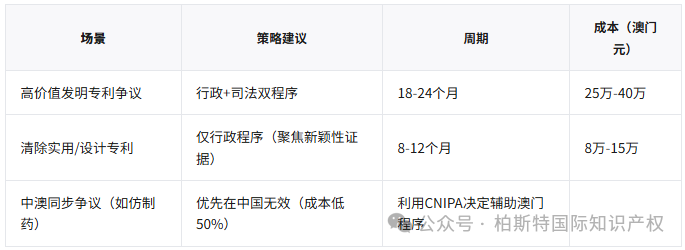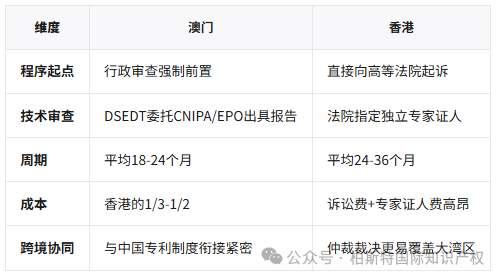- Knowledge
Preface
The patent invalidation system in Macau adopts a dual track model of administrative review and final judicial judgment, which has distinct characteristics of the mainland legal system. The following analysis is conducted from the dimensions of legal framework, procedural rules, and cross-border connection, with a focus on comparing the differences with the Hong Kong system:
1、 Institutional framework: dual checks and balances
1. Legal Basis
Core regulations:
Articles 129-135 of the Industrial Property Law System (Decree No. 97/99/M)
Provisions of the Civil Procedure Code on Judicial Appeals
Management organization: Intellectual Property Department of Macau Economic and Technological Development Council (DSEDT)
2. Invalid program dual track path

2、 Administrative Review Procedure (Pre requisite Stage)
1. Startup conditions
Subject: Any powerful related person
Reason scope: (1) Lack of novelty/creativity (2) Insufficient specification (3) Modification beyond scope (4) Violation of public order and good customs
2. Review process
Submission: Evidence of Invalid Request (in one of the three languages: Chinese/Portuguese/English, official translation is required for non Portuguese)
Defense period: Patent holder responds within 30 days
Technical review: DSEDT can entrust a retrieval agency to issue a report (such as China China National Intellectual Property Administration)
Decision period: usually 12-18 months
Key rules:
Requestable parts are invalid (Article 131)
The patentee may submit amendment requests simultaneously (limited to non claims in the specification)
3、 Judicial appeal procedure
1. Jurisdiction Court: Primary Court
Appeal deadline: Within 30 days after receiving the administrative decision
Scope of review: Determination of legal application facts (new evidence may be introduced)
Special procedure: Simplified process applicable to the Administrative Litigation Law (usually concluded within 6-12 months)
2. Final review mechanism
Court of Appeal: Intermediate Court (Legal Trial)
Final: No further appeal to the Court of Final Appeal (different from CFA in Hong Kong)
4、 Patent Types and Invalidity Characteristics

Note: Most invention patents in Macau are based on Chinese extended patents (accounting for 83% of the total), but invalidation examinations are still conducted independently.
5、 Core Points of Evidence Rules
1. Language requirements
Non Portuguese speaking evidence must be authenticated and translated by the Macau Notary Public Office (accounting for approximately 35% of the cost)
Accept the search report issued by the China National Intellectual Property Administration of China (Portuguese abstract required)
2. Technical investigation
Official commission: DSEDT may request technical opinions from the Chinese/European Patent Office
Expert assistance: Parties may apply for technical advisors to appear in court (designated by the court or recognized by both parties)
6、 Cross border linkage mechanism
1. The particularity of extended patents in China
Invalid basis: The reexamination decision of the Chinese Patent Office can be cited, but it is not binding
Parallel Program: China's Invalid Decision Does Not Affect Macau's Administrative Procedure (Case: 2020 Drug Patent Invalidation Case)
2. Evidence collaboration in the Greater Bay Area
According to the Guangdong Macao Intellectual Property Cooperation Agreement, evidence such as enterprise registration and quality inspection reports can be accessed across borders
Hong Kong court judgment can be used as supporting evidence (requires Portuguese translation and notarization)
7、 Enterprise operational strategy
Path selection suggestions

8、 Comparison of System Advantages and Disadvantages (vs. Hong Kong)

Core Tip:
The Macau system is more suitable for cases with limited budgets or requiring the use of Chinese review resources; When it comes to complex technical disputes, Hong Kong's expert witness system is more advantageous. Enterprises should dynamically choose their jurisdiction based on patent type, market importance, and cost budget.




